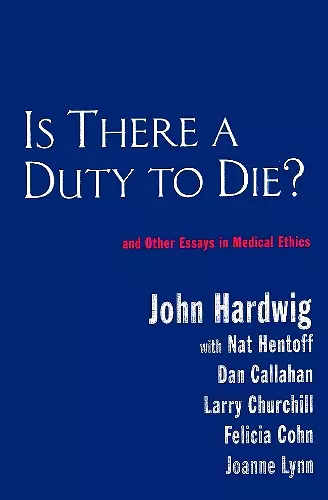Is There a Duty to Die?
And Other Essays in Bioethics
Format:Paperback
Publisher:Taylor & Francis Ltd
Currently unavailable, and unfortunately no date known when it will be back

Amid the controversies surrounding physician-assisted suicides, euthanasia, and long-term care for the elderly, a major component in the ethics of medicine is notably absent: the rights and welfare of the survivor's family, for whom serious illness and death can be emotionally and financially devastating. In this collection of eight provocative and timely essays, John Hardwig sets forth his views on the need to replace patient-centered bioethics with family-centered bioethics. Starting with a critique of the awkward language with which philosphers argue the ethics of personal relationships, Hardwig goes on to present a general statement on the necessity of family-centered bioethics. He reflects on proxy decisions, the effects of elder care on the family, the financial and lifestyle consequences of long-term care, and physician-assisted suicide from the perspective of the family. His penultimate essay, Is There a Duty to Die? carries the idea of family-centered ethics to its logical, controversial, conclusion; comments upon this essay from Daniel Callahan, Larry Churchill, Joanne Lynn, and journalist Nat Hentoff offer differing views on this highly charged subject. As advances in medicine prolong patient's lives, the welfare of those ultimately responsible for medical care-the family-must be addressed. Hardwig's courageous and illuminating essays set forth a new direction in bioethics: one that considers the welfare of everyone concerned.
"Is There a Duty to Die? poses a powerful challenge to mainstream 'patient-centered' bioethics, leading us to rethink the significance of family interests in treatment decision. Hardwig writes with clarity, wit, and elegance; these essays are truly a pleasure to read." -- Chris Hackler, Director of the Divison of Medical Humanities, University of Arkansas for Medical Sciences
"With clarity and compassion, John Hardwig advocates a paradigm shift from a patient-centered to a family-centered bioethics. Just as families have a duty to care for those who are ill, those afflicted have a reciprocal duty not to become a crushing burden, which in some cases means a duty to die. The challenge for those who would object to this provocative idea, is to reform the health care system so as to mitigate any such duty." -- Francoise Baylis, Associate Professor of Medicine and Philosophy, Dalhousie University, Canada
"John Hardwig's precise and insightful essays intrepidly question moral orthodoxies and propose alternatives that are difficult to reject." -- Helga Kuhse, author of Caring: Nurses, Women and Ethics
"John Hardwig identifies some of the most difficult questions in bioethics, which others are too timid to confront, and writes about them in an admirably clear, lucid, and down-to-earth style. His Afterword, in which he elicits from a group of elderly what it means to them to die a responsible death, is itself worth the price of the volume. Any academic bioethicist who can engage in this sort of conversation with average people, and come away with such a rich set of insights, is a person well worth listening to." -- Howard Brody, Director, Center for Ethics and Humanities in the Life Sciences and author of the Healer's Power
"This is an important collection of essays that nurses interested in the moral dimension of their work will find thought provoking." -- Nursing Times
"John Hardwig's precise and insightful essays intrepidly question moral orthodoxies and propose alternatives that are difficult to reject." -- Helga Kuhse, author of Caring: Nurses, Women and Ethics
"This complication of essays, primarily by Harwig, centers on responsible death: when and how decisions should be made. Hardwig explores his personal philosophy on life, death, and the interactive nature of human beings; he believes that all decisions made by an individual have an impact on others, especially family. . . Generally well written, provocative, insightful, and based on the view that illness, suffering, and, especially, death are to be avoided as long as possible." --Choice, October 2000."
"This compilation of essays, primarily by Harwig, centers on responsible death: when and how decisions should be made. Hardwig explores his personal philosophy on life, death, and the interactive nature of human beings; he believes that all decisions made by an individual have an impact on others, especially family. . . Generally well written, provocative, insightful, and based on the view that illness, suffering, and, especially, death are to be avoided as long as possible." --Choice, October 2000."
"...these essays all take stands on important, though often neglected, questions in miomedical ethics related to an alleged duty to die. While controversial, Hardwig argues clearly and - in large part - convincingly...The commentaries and response add a dialectical give-and-take that makes this volume attractive for anyone teaching "duty to die" and related questions in a bioethics or applied ethics course." -- Ethics, January 2003
ISBN: 9780415922425
Dimensions: unknown
Weight: 410g
224 pages